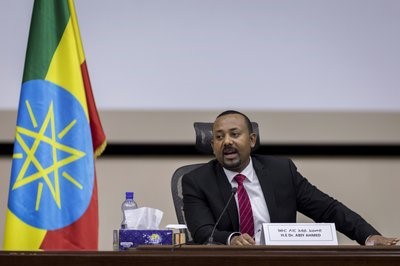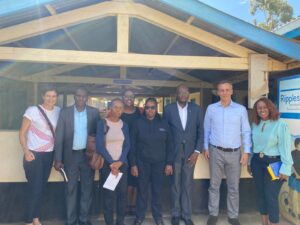The Tribulations of Ethiopian PM Abiy Mohamed

By Joseph Owuoth
What is the background story?
Abiy Ahmed Ali, the Ethiopian Prime Minister, came to power riding on rifts within the major parties in the country. PM Abiy assumed power and for the last five years adeptly managed the different political factions in the country leading to him winning the Nobel Peace Laureate in 2019. Despite these admirable achievements from the PM , Ethiopia has however remained in turmoil for the best part of his time in office.
In early November 2020, the Tigray Peoples Liberation Front (TPLF) attacked (by their own admission) the Northern Command of Ethiopia’s Federal Defence Forces stationed in Tigray and overrun the location. The federal government militarily responded and in three weeks captured the regional capital of Mekele on 28th November 2020 ending the full scale internal hostilities. The post war situation remains on low intensity mode and remains clouded with several accusations of heavy handedness against the Tigray civilians from the Ethiopian Federal forces being bandied about.
What is so special with the Northern Command Headquarters?
The Northern command held the bulk of the Ethiopian federal forces resources which explains to the resolve and the overall strategy of the TPLF to capture the Headquarters and from this use it as a defence against the central government. It also explains why the Federal forces have resorted to use all manner of heavy armaments- including fighter aerial attacks – to defeat the TPLF.
It gets worse.
Reportedly, most of the resources then held at the Northern command have since then fallen into the hands of the Eritrean troops which had allegedly mustered thousands of troops to support the Ethiopian forces. This move is worrisome considering that the capture of the major military ordinance held in the Northern Command by Eritrea sort of shifts the military balance heavily in favour of Eritrea. According to sources, the Eritreans have been involved in mass murders and pilferage in Tigray and have shown no inclination to go back to Eritrea despite the conflict being effectively over.
What are the likely implications of the Tigrinya conflict?

Three potential risks are evolving from this conflict in Tigray.
First, Egypt and Sudan are leveraging on these hostilities to pressure Ethiopia to bow to their demands related to the GERD and land disputes within the Amhara region. If Sudan succeeds to take over their lands, then PM Abiy is bound to lose his support among the Amhara elite which would further heighten the tension in the country.
The second threat is the risk of balkanization of the country if the internal politics after the conflict are not effectively managed by the PM in the areas of Oromia, Ogaden and Tigray where earlier calls for secession have always been ruthlessly silenced by the central government.
The third threat is lasting conflicts, the presence of Eritrea forces in Tigray and the manner in which the war has been carried out in violation of International laws has led to heightened tension among the populace. The invitation of Eritrea forces (and maybe Somali troops too) to intimately fight in support of Ethiopian forces, understandably, makes the Tigray people feel like the military campaign was planned for their destruction and sows seeds of alienation with the attendant consequences.
What effect has this Tigrinya conflict impinged on Somalia?
Huge unknowns still persist post the Tigrinya conflict, pressure is growing on Somalia’s government amid allegations that Somali youth who had been receiving basic military training in Eritrea have been sent to fight together with the Eritrean forces in Tigray in support of the Ethiopian troops. A consequence of this is Mothers have held rare protests in Somalia’s capital, Mogadishu, and elsewhere, demanding to know the fate of their children in Eritrea.
As expected Ethiopia has denied these reports of the presence of Somali soldiers in Tigray, just as it has continued to deny the presence of Eritrean forces.
The issue has emerged at a sensitive time in Somalia especially since the current Somali government mandate ends on February 8th with no end in sight to the disagreement over how to conduct the parliamentary and presidential elections.
The word in the Mogadishu streets is that Somalia president has reached an arrangement with the Eritrean and Ethiopian leaders that the two countrie’s forces too will militarily support him in his quest to retain power and subdue the two federal states opposed to his rule.
How will this war impact Kenya?
Ethiopia’s Southern Region bordering Kenya and home to the Oromo community has always been restive and are likely to attempt a secessionist move from the central Ethiopian government. Such a move is likely to cause a security headache to Kenya in some form attributed to the Oromo Liberation Front. (OLF).
The new found friendship between Mogadishu and Addis Ababa is worrisome particularly with the open hostility from Mogadishu against Nairobi. The tiff is likely to affect the Kenyan troops deployed under the AMISOM umbrella in Somalia.
What about Sudan?
The two Horn of Africa nations have long been at odds over the Al-Fashaqa region, where Ethiopian farmers cultivate fertile land claimed by Sudan. Since early December, Sudan has accused Ethiopian ‘forces and militias’ of ambushing Sudanese troops along the border, while Ethiopia has accused Sudan of killing ‘many civilians’ in attacks involving ‘heavy machine guns’. The attempted talks between these two countries has not yielded fruits with Ethiopia disengaging from the border talks potentially complicating efforts to defuse a dispute that has fuelled deadly clashes in recent weeks. Tension and light skirmishes are bound to continue but no full scale hostilities between the two countries are envisaged. Egypt is likely to remain a penetrating observer over this situation and assumedly poised to offer all manner of support to Sudan.
What has been the reaction of the international community?
The passive reaction of the international community is an indication that PM Abiy has a carte blanche to wage war on Tigray. Ethiopia is the diplomatic capital of Africa and many African leaders fear that the disintegration and balkanization of Ethiopia may have a catastrophic impact in Africa and inspire future calls for secessionist movements in other parts of Africa.
What are final thoughts?
It is imperative that PM Abiy skilfully manage the post conflict situation in Tigray as any wrong move is bound to negatively affect the horn of Africa conflict ecosystem. PM Abiy remains in a vulnerable position as the Tigray conflict is bound to complicate his move to centralize power, reinstate the rule of law and re-engineer the country’s political landscape.








